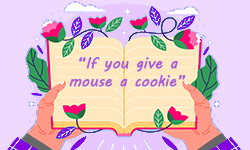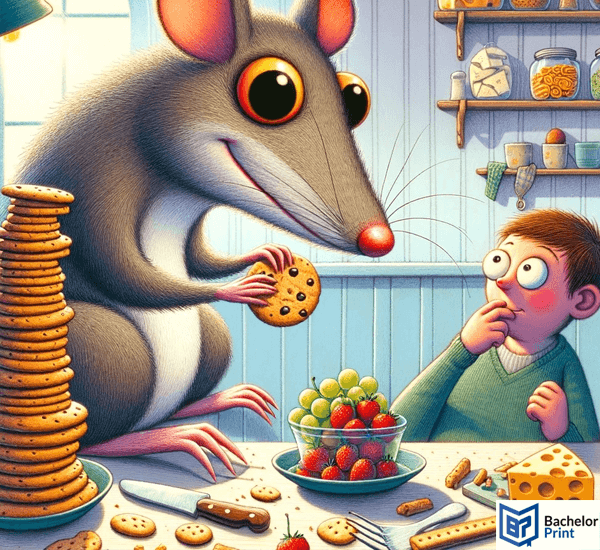
“If you give a mouse a cookie” is a commonly known proverb in the English language that has its origins in a children’s book of the same name. The meaning of this saying depicts the cause and effect of initial generosity that might lead to the exploitation of said generosity. Grasping the meaning of proverbs demands an understanding of cultural and social contexts, which is key to having a greater grasp of the world.
The core meaning of this proverbial saying is that small actions can lead to a series of escalating demands or events. It illustrates how a simple, seemingly harmless decision can set off a chain reaction of additional requests or consequences. The proverb serves as a cautionary tale about the potential unintended results of indulging even minor requests or making small concessions.
The following examples will highlight the unexpected exploitation inherent in the proverb “if you give a mouse a cookie,” and will detail several instances that clarify its meaning:
These examples display several situations in which one small action can lead to a series of escalating demands. “If you give a mouse a cookie” illustrates how a seemingly harmless favour can set off a chain reaction of additional consequences.
This proverb could be interpreted as an example of the slippery slope fallacy when used in arguments or discussions to caution against a sequence of events. This logical fallacy occurs when someone argues that a relatively small first step inevitably leads to a chain of related events culminating in some significant negative effect. It assumes without justification that benign actions will lead to extreme outcomes.
Explanation of the visual meaning
The illustrations of the children’s book “If You Give a Mouse a Cookie” effectively capture the proverb’s underlying message about the consequences of initial kindness. The boy symbolizes generosity or a willingness to help by giving a cookie to the mouse without expecting anything in return. The small and seemingly harmless mouse in the book represents the recipient of the initial kindness. However, its subsequent actions reveal a deeper, more complex nature as it’s asking for more and more, which shows how small demands can escalate quickly. Applying this saying to real-life situations would highlight the growing desire for more, making the sweet little mouse appear to purposefully capitalize on the selfless boy’s resources. His facial expression in the image conveys surprise and potential regret at the unforeseen escalation of demands, highlighting the lesson about considering the possible outcomes of even the smallest actions.
Click on the button below, to watch a read-aloud version of this book along with its images.
An alternative interpretation focuses on the dynamics of the dependency and expectations in relationships, whether personal, social, or economic. The person giving the cookie represents an individual or entity offering help. This initial act can be considered an attempt to provide support or solve a small problem. The cookie, a seemingly insignificant offering, symbolizes the beginning of a transactional relationship. The mouse’s behaviour after receiving said cookie reflects human nature’s tendency to develop expectations based on past interactions. Each request builds upon the previous one, illustrating a slippery slope where the initial acts of charity or support escalate into a continual expectation of more substantial assistance.

How to use it
This proverb can be used to illustrate the concept of unintended consequences and escalating demands. This is how you can apply it to various modern contexts.
This phrase may be used in personal relationships or confrontations where someone cautions someone else about the dangers of giving in to small demands, which may lead to bigger and possibly unreasonable requests. It serves as a reminder to set boundaries early on to avoid a pattern of escalating expectations.
In debates or discussions, the proverb can be invoked to argue against initial concessions or minor policy changes that might lead to larger, unanticipated commitments.
In literature, this proverb can be used to analyse character’s decisions and their impact through a narrative. It helps in discussing themes related to cause and effect, demonstrating how characters’ small actions lead to larger narrative developments.
This proverb is particularly relevant in social commentary when discussing behavioural patterns or societal issues that one small change can lead to significant changes elsewhere.
Origin and history
The phrase “if you give a mouse a cookie” originates from a children’s book name by Laura Numeroff. It has become a metaphor that describes a situation where a small, seemingly innocuous action leads to events that result in a series of larger and unforeseen consequences. The story in the book of the same name highlights how giving a mouse a cookie sets off a cascade of requests, each flowing from the previous one in an almost inevitable sequence. This metaphorical expression is often used in discussions about the importance of setting boundaries or considering the potential ramifications of one’s actions in various contexts.
Some say the story is supposedly an ironic warning about the consequences of altruism, the selfless concern for the well-being of others without regard for one’s benefits. It was published in 1985 when the welfare system was a significant topic of political debate in the United States. According to conservative critics, the relationship between the boy and the mouse could be interpreted as the relationship between the government and those who rely on it for support. Ex-President Ronald Reagan and other conservative politicians warned that welfare would encourage Americans to depend on the generosity of government, and thus would decrease their willingness to work. The cycle of poverty would perpetuate as children would follow in the footsteps of unmotivated adults.
Now, if we go back to the proverb’s origins, we don’t know the reason the mouse was given a cookie in the first place; did he ask for it, or was it a donation? The mouse seemingly just wanted its basic needs covered until he asked for more things such as crayons and paper to draw the boy a picture. In the end, the selfless boy and the mouse sit down together and enjoy another cookie. One could say that if you give a mouse a cookie, it will feed its family for a week. However, if you teach the mouse to make cookies, it will feed its family forever.
“If you give a mouse a cookie, he’s going to ask for a glass of milk.
When you give him the milk, he’ll probably ask you for a straw.
When he’s finished, he’ll ask you for a serviette.
Then he’ll want to look in a mirror to make sure he doesn’t have a milk mustache.”
Similar proverbs and synonyms
There is a list of like-minded proverbs and synonyms that focus on the themes of exploiting an initial act of goodwill to extract more benefits. The subsequent list presents some well-known ones:
- Give them an inch, and they’ll take a mile
- Opening Pandora’s box
- Slippery slope
- A snowball effect
- Feeding the beast
- Triggering a domino effect
- Unleashing a series of demands
- Exploitation of generosity
- Taking advantage of someone’s kindness
- Capitalizing on resources of another
FAQs
The literal interpretation of this widely recognized metaphor is that if you give a small favour, such as giving a mouse a cookie, it can lead to a series of escalating requests and actions.
If you give a mouse a cookie, he’s going to ask for a glass of milk.
When you give him the milk, he’ll probably ask you for a straw.
When he’s finished, he’ll ask you for a serviette.
Then he’ll want to look in a mirror to make sure he doesn’t have a milk mustache.
Similar words and synonyms for this proverb can be:
- Exploitation
- Taking advantage of someone
Find similar proverbs in the list in this article.
The moral lesson of this proverb is about the importance of understanding and managing expectations. It teaches that even small actions can have larger repercussions, and that being aware of the potential for escalating demands can help in setting appropriate boundaries. It highlights the importance of foresight, responsibility in decision-making, and concern for relationships.
numerous advantages for Canadian students:
- ✓ 3D live preview of your configuration
- ✓ Free express delivery for every order
- ✓ High-quality bindings with individual embossing

